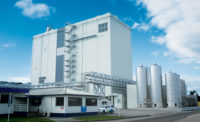Fonterra builds value-add capacity at China plant
The expansions will see Te Rapa go from six cream product lines to eight, incorporating state-of-the-art technology to achieve highest possible output.
Fonterra USA, Rosemont, Ill., announced plans to build a $20 million expansion to its Te Rapa, China, site to meet growing demand for cream cheese and mini-dish butter.
“Much of the demand we’re seeing for products like the mini-dish butter is from hotels, restaurants and commercial kitchens in China – all out-of-home eating experiences where consumers are choosing dairy to complement their meal,” says Robert Spurway, chief operating officer global operations. “Where in the past, many of these markets have trended toward non-dairy creams and spreads, we’re seeing a real desire for natural dairy in both food preparation and at the table. And, while the foodservice aspects are important, it is the latter that is really exciting – consumers actively choosing to incorporate more dairy into their daily diets.”
China is the greatest growth driver for Fonterra’s consumer and foodservice business.
“Recently we’ve seen the demand, particularly out of China, exceed supply,” says Spurway. “So, this expansion is all about responding to the market, investing in building capacity and delivering on our value-add strategy by converting more milk into higher-returning products. It will also give us more choices in the products we’re able to make, so we can be more responsive to our customers.”
The expansions will see Te Rapa go from six cream product lines to eight, incorporating state-of-the-art technology to achieve highest possible output.
The new butter line will see production more than double from 250 million to 650 million mini-dishes per year.
Meanwhile the additional cream cheese line will increase plant capacity from 30,000 tons to 33,500 tons per year, as well as add capability to manufacture 5kg blocks in addition to the 20kg ones currently produced.
The Te Rapa site was established in 1967 as a powder drying facility. The cream plant was established in 1997 for the manufacture of consumer and bulk butter and cream cheese. An additional cream cheese line was added in 2013.
The Te Rapa plant employs around 500 staff and produces 80,000 tons of cream products per year.
Looking for a reprint of this article?
From high-res PDFs to custom plaques, order your copy today!






